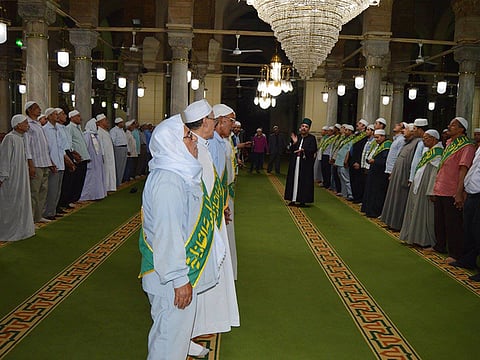Egyptians find solace in Sufi sessions
Devotees defy militants after attack on Sufi mosque that killed 310 last month

Cairo: The evening prayers are over. Most worshippers have just departed from the mosque named after Zainab, the granddaughter of the Prophet Mohammad (PBUH).
About two dozen remain in the elaborately decorated mosque located in the Islamic Cairo quarter.
With white caps on their heads, the faithful briskly rise to their feet. They stand in rows and start their Dhikr session, a devotional practice by Sufi Muslim mystics. They symmetrically move their heads forward and backward while chanting God’s different names in a practice they say is aimed at attaining spiritual tranquillity and purity.
“Since I was a young child, I used to come here with my father to attend the Dhikr and remember Allah,” says Al Sayed Fathi, a herbs merchant. “It makes me feel I’m close to Allah and cleanse my heart of the burdens of life. During the Dhikr, you feel you are floating in the air and forget about worldly concerns,” adds the 38-year-old man, who is a follower of Al Shazlia, a major Sufi order in Egypt.
Fathi denies claims that the Sufi rituals are alien to Islam.
“The extremists are the ones who propagate these lies. Like any other Muslims, we pray, observe fasting in Ramadan, pay zakat and go on Haj. In addition, we do other things that reflect the true spirit of Islam as a religion of love, forgiveness and purity,” he told Gulf News.
“Do we deserve to be killed for this?”
Last month, suspected extremist militants killed 310 worshippers in an attack on a mosque in North Sinai, marking the deadliest assault in Egypt’s modern history. The targeted mosque is affiliated to a local Sufi order. Extremists regard Sufis as apostates.
In the aftermath of the attack, Egyptian authorities tightened security around mosques frequented by Sufis.
“We are not afraid of terrorists. No one dies before his date [of death],” added Fathi.
The word “Sufism” is believed to have originated from “Suf”, an Arabic word for “wool”, which refers to woollen clothes worn by early Muslim mystics. Some linguists believe that ‘Sufism’ suggests ‘purity’.
Sufis account for about 15 million of Egypt’s mostly Muslim population of nearly 95 million. They are followers of 73 orders spread across the country.
Sufism devotees in Egypt revere Muslim ‘saints’ by visiting their shrines and celebrating their birthdays at festivals where they chant religious hymns in their praise. Extremists see these practices as heretical.
In a gesture of defiance to militants, several Sufi orders staged traditional street marches and celebrations in several parts of Egypt to mark the Prophet’s birthday that fell this year a few days after the Sinai attack.
The Waqfs Ministry, which is in charge of mosques in Egypt, launched a drive this month aimed at promoting Sufism against what it called “attempts by hardliners to distort” it.
Days ago, senior Muslim clerics gathered in a Cairo mosque in defence of Sufism.
‘Islamic Sufism is a creed of moderation and good behaviour,” Ahmad Hashem, a member of Sunni Islam’s seat of learning Al Azhar, told the gathering. “Sufism is a constructive, not destructive call,” he added.
Echoing the discourse, Abdul Hadi Al Qasbi, a leading Sufi, told the same gathering: “Sufism is about love, forgiveness and the complete application of Allah’s book [the Quran] and the Prophet’s sunna [traditions].”
Al Qasbi, the head of the Supreme Council for Sufi Orders, struck a defiant note. “We will not close any Sufi shrine or mosque for fear of terrorism. The attack on Al Rawdah mosque did not target Sufis only,” he said, referring to last month’s assault in Sinai.
“It was aimed at every Egyptian. Terrorism has targeted all people of the country: the army, police, Coptic Christians and Muslims.”
Sign up for the Daily Briefing
Get the latest news and updates straight to your inbox



